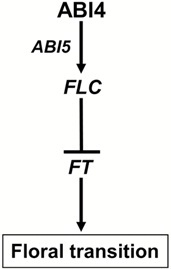Dr. XIE Qi’s group in the Institute of Genetics and Developmental Biology (IGDB), Chinese Academy of Sciences, recently reported that ABA inhibits floral transition by activating FLOWERING LOCUS C (FLC) transcription through ABSCISIC ACID-INSENSITIVE 4 (ABI4) with solid evidences including genetics, molecular biology, plant physiology and biochemical data. Consequently, ABI4 also is the second identified gene regulating plant floral transition in ABA signaling pathway, after ABI5.
Firstly, the researchers demonstrated that the
abi4 mutant showed the early flowering phenotype whereas the
ABI4-overexpressing
(OE-ABI4) plant delayed floral transition. Consistently, qRT-PCR assay revealed that the
FLCtranscription level was downregulated in
abi4, but upregulated in
OE-ABI4. The change of
FT level was consistent with the pattern of
FLC expression. Following Chromatin immunoprecipitation qPCR (ChIP-qPCR), Electrophoretic Mobility Shift Assays (EMSA) and tobacco transient expression analysis showed that ABI4 promotes
FLC expression by directly binding to its promoter.
Further, genetic analysis demonstrated that
OE-ABI4::flc-3 could not alter the
flc-3 phenotype.
OE-FLC::abi4 showed a markedly delayed-flowering phenotype, which mimicked
OE-FLC::WT, and suggested that
ABI4 acts upstream on
FLC in the same genetic pathway.
The study entitled “ABSCISIC ACID-INSENSITIVE 4 negatively regulates flowering through directly promoting
Arabidopsis FLOWERING LOCUS Ctranscription” has been published online in
Journal of Experimental Botany (
DOI: 10.1093/jxb/erv459).
Dr. SHU Kai, associate professor of Sichuan Agricultural University, and CHEN Qian, Ph. D student of IGDB are the co-first authors. This work was supported by grants from The Ministry of Science and Technology of China and the National Natural Science Foundation of China.
Figure. A proposed working model in which ABA inhibits floral transition through activating FLC transcription by ABI4 and ABI5. (Image by IGDB)
CONTACT
Dr. XIE Qi
Email: qxie@genetics.ac.cn
 Figure. A proposed working model in which ABA inhibits floral transition through activating FLC transcription by ABI4 and ABI5. (Image by IGDB)CONTACTDr. XIE QiInstitute of Genetics and Developmental Biology (IGDB), Chinese Academy of Sciences, BeijingEmail: qxie@genetics.ac.cn
Figure. A proposed working model in which ABA inhibits floral transition through activating FLC transcription by ABI4 and ABI5. (Image by IGDB)CONTACTDr. XIE QiInstitute of Genetics and Developmental Biology (IGDB), Chinese Academy of Sciences, BeijingEmail: qxie@genetics.ac.cn CAS
CAS
 中文
中文




.png)
